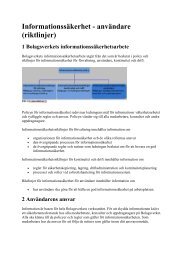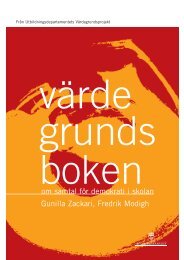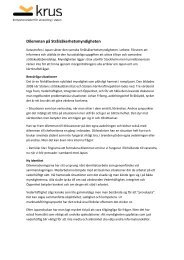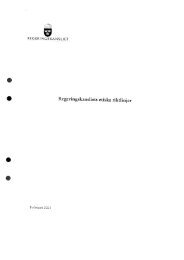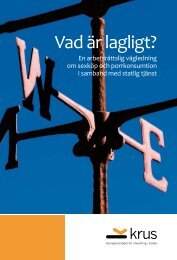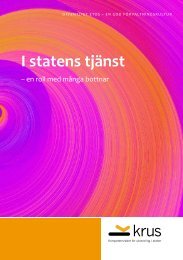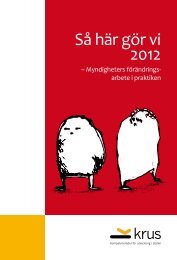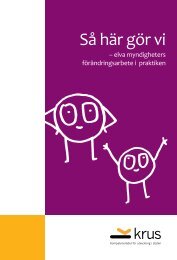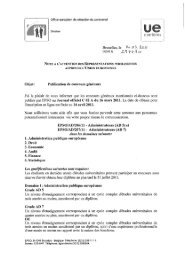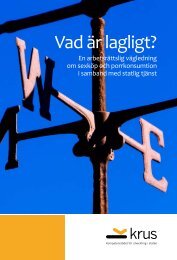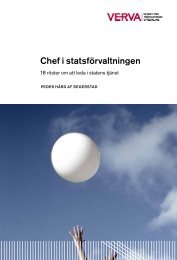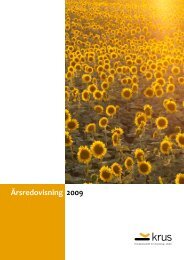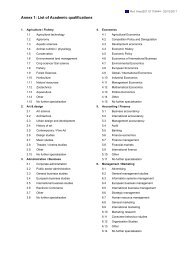Dialogkompetens i skolans vardag - Publikationer - LTU - Luleå ...
Dialogkompetens i skolans vardag - Publikationer - LTU - Luleå ...
Dialogkompetens i skolans vardag - Publikationer - LTU - Luleå ...
Create successful ePaper yourself
Turn your PDF publications into a flip-book with our unique Google optimized e-Paper software.
Relation between tools used in action research and the ZPD 553<br />
However, as Säljö (2000) notes, in the attained competence there are always different<br />
kinds of unspoken knowledge to be understood and used via interaction in the ZPD.<br />
In Vygotsky’s view, people are continually undergoing development and change.<br />
In every situation it is possible to acquire knowledge and skills from other people in<br />
different teamwork situations. Vygotsky sees people as continuously en route to<br />
appropriating new types of learning tools, based on what they already know. In other<br />
words, this is a way of looking at human development and learning as always being in<br />
the ZPD. In Vygotsky’s terms, this zone is the gap between what people already<br />
know (zone 1) and what they achieve with the help of guidance from, or collaboration<br />
with, a (more) capable colleague. Consequently, it is thus important to assist the<br />
person who wants to learn by providing communicative support or scaffolding<br />
(Wood et al., 1976).<br />
The metaphor of scaffolding is often defined as the provision of structures within<br />
the ZPD to bridge the ‘gap’ mentioned earlier. These structures can be provided by<br />
colleagues or by an outsider. The scaffolding provided will vary within the group.<br />
Being involved in scaffolding in the ZPD may be looked upon as guidance within a<br />
special context, with a view to being one another’s ‘critical friend’ (Handal, 1999;<br />
Säljö, 2000). From Bakthin’s (1981) perspective there is great value in being able to<br />
perceive differences, where learning means changing opinions and gaining an understanding<br />
of something new. In his view, a dialogue can be either verbal, written or an<br />
inner dialogue interacting with a person’s own reflections. In the ZPD, the participants<br />
are aware that they need one another’s support in order to develop further. To<br />
achieve this, the participants have a joint responsibility for knowledge development,<br />
preferably from several perspectives. It is really a matter of producing knowledge<br />
together with one’s own and others’ social practice. In due course, this knowledge will<br />
make it possible to progress to zone 3.<br />
After contributing to and learning from the scaffolding provided in the ZPD, one<br />
may find that zone 3 deals with meta-reflections of these processes or, to put it<br />
another way, learning how to be able to change. This implies that participants feel<br />
that they possess and have control over their own development work. This can create<br />
an awareness of one’s own commitment to completing all the stages in the action<br />
research spiral (Kemmis & McTaggart, 1982). Thus, in essence, it is the participants<br />
themselves who are the actors in producing meaning in the framework for the sociocultural<br />
possibilities on offer (Säljö, 2000). It is almost impossible to reach zone 3<br />
without first being active in the ZPD. Coming directly into this zone may present far<br />
too great a challenge due to the lack of a deeper understanding.<br />
ZPD applied in different contexts<br />
According to Mellin-Olsen (1989) three aspects of responsibility affect learning in the<br />
classroom; the responsibility for the goals, the responsibility for choosing tools, and<br />
the responsibility for how to use those tools. As Mellin-Olsen explains in his study,<br />
control, in one sense, also affects the process in a positive direction. Tools to be used<br />
by participants in action research are often introduced by an outsider, although it is



